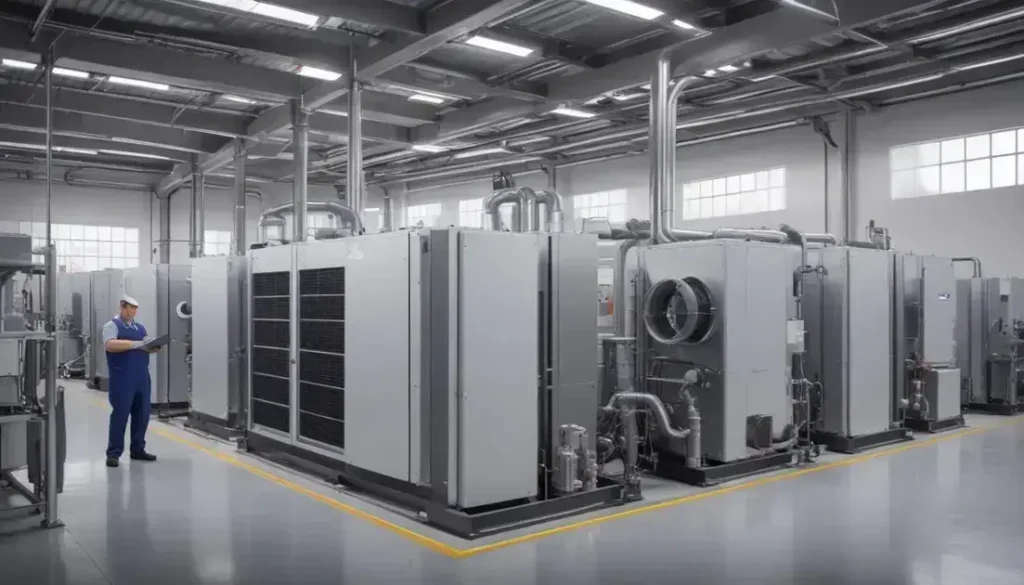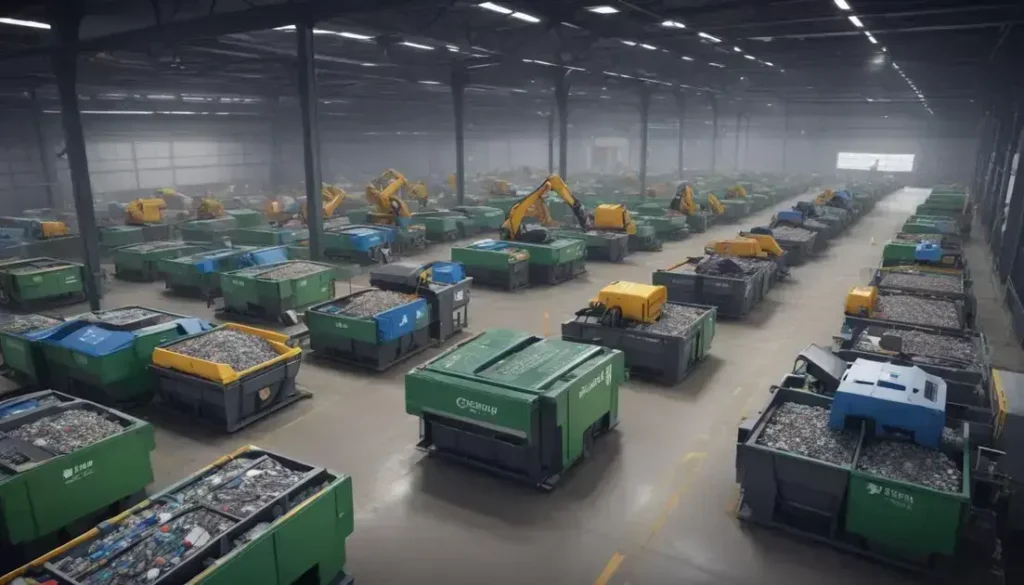Heat pumps are efficient devices that provide both heating and cooling by transferring heat from the air, ground, or water, significantly reducing energy costs and carbon emissions while facilitating the transition to renewable energy solutions.
Heat pumps are becoming increasingly essential for sustainable building practices. As Johnson Controls expands its facility in Denmark, many UK businesses should consider the far-reaching implications of this development.
Introduction to heat pump technology
Heat pump technology leverages renewable energy sources to provide heating and cooling solutions for buildings. By transferring heat from the ground, air, or water, heat pumps are becoming increasingly efficient and environmentally friendly. This process not only reduces reliance on fossil fuels but also significantly lowers energy bills.
One of the key advantages of heat pumps is their ability to operate as both heating and cooling systems. In winter, they extract heat from external sources and transfer it indoors, while in summer, they reverse the process to provide cooling. This dual functionality makes them an attractive option for homeowners and businesses alike.
The recent advancements in heat pump technology have led to improved efficiency ratings. Modern systems can achieve coefficients of performance (COP) exceeding 4, meaning they can produce more than four units of heat for every unit of electricity consumed. This level of efficiency is a game changer in the race towards net-zero carbon emissions.
Furthermore, government incentives and increasing public awareness of climate change are driving the uptake of heat pumps. As more consumers seek sustainable options, the demand for innovative heat pump installations is expected to rise, encouraging further technological advancements.
Overview of Johnson Controls’ expansion
Johnson Controls has recently announced a significant expansion of its facilities in Denmark, aiming to enhance its capacity in the production of heat pumps. This development is aligned with the global push towards sustainability and reducing carbon footprints. By increasing its manufacturing capabilities, Johnson Controls is set to play a crucial role in meeting the rising demand for renewable energy solutions.
The expansion will not only bolster the company’s operational efficiency but also lead to job creation within the local community. This move is expected to attract skilled workers and contribute to Denmark’s position as a leader in green technology. With a focus on innovation, Johnson Controls is investing heavily in research and development to advance heat pump technology.
This production increase signifies the company’s commitment to supporting UK businesses looking to adopt more sustainable energy solutions. As firms in various sectors embrace heat pump systems, the demand for reliable manufacturers like Johnson Controls will undoubtedly rise.
Furthermore, this expansion highlights the importance of international collaboration in achieving global sustainability goals. With climate change being a pressing issue, the proactive measures undertaken by companies such as Johnson Controls are essential for paving the way towards a more sustainable future.
Impact of heat pumps on energy efficiency
Heat pumps significantly enhance energy efficiency compared to traditional heating systems. By transferring heat instead of generating it from scratch, heat pumps can achieve efficiencies three to four times greater than conventional boilers. This process of heat transfer utilizes electricity to move heat rather than consume fuel directly, making it a cleaner and more sustainable option.
The integration of heat pumps into buildings not only reduces energy consumption but also lowers greenhouse gas emissions. As more households and businesses switch to heat pumps, the overall demand for fossil fuels decreases, contributing to a reduction in environmental impact. This aligns with global efforts to combat climate change.
By optimising energy usage, heat pumps also lead to cost savings for consumers. With rising energy prices, the long-term financial benefits of installing a heat pump system become increasingly attractive. These systems offer both heating and cooling, thus streamlining energy management throughout the year.
Furthermore, government incentives and regulations are encouraging the adoption of heat pump technology. As energy efficiency becomes a key requirement in building codes, the shift towards heat pumps is expected to accelerate. They represent a long-term solution for energy conservation, making them essential in the transition towards a sustainable energy future.
Sustainability benefits of heat pumps
Heat pumps offer a range of sustainability benefits that align with the global shift towards greener energy solutions. By using natural heat sources, such as the air, ground, or water, these systems minimise reliance on fossil fuels. This transformation substantially lowers carbon emissions, making heat pumps an essential component in the fight against climate change.
One of the key features of heat pump technology is its capacity to operate efficiently in various climates. Unlike traditional heating methods, heat pumps can provide both heating and cooling, utilising the same system year-round. This versatility reduces the need for separate heating and cooling units, thereby saving energy and resources.
The installation of heat pumps can also enhance the energy efficiency of buildings. By integrating these systems, homes and businesses can achieve significant reductions in their energy consumption, leading to lower energy bills. As energy costs continue to rise, heat pumps represent a financially prudent choice for environmentally conscious consumers.
Moreover, government incentives and regulations are increasingly favouring renewable energy technologies. As more regions implement policies to encourage sustainable practices, heat pumps are likely to gain traction as a preferred heating and cooling solution, driving the transition to a low-carbon economy.
Job creation in the UK
The expansion of heat pump manufacturing facilities, such as those by Johnson Controls, is set to generate significant job creation in the UK. As the demand for renewable energy solutions rises, the need for skilled workers to design, install, and maintain these systems has become increasingly critical. This presents a unique opportunity for local communities to benefit from new employment prospects.
In addition to direct jobs in manufacturing, there is potential for growth in related sectors, including logistics, sales, and service. Such developments can have a ripple effect on the economy, providing ancillary job opportunities that support the wider industry. Training programmes aimed at equipping the workforce with necessary skills will be essential in meeting this demand.
Furthermore, the heat pump sector aligns with the UK’s commitment to achieving a net-zero carbon economy by 2050. Government initiatives and incentives are encouraging companies to invest in green technologies. As more firms pivot towards sustainable practices, job creation in this area can significantly contribute to the UK’s economic recovery post-pandemic.
This movement towards renewable energy and heat pump technology not only addresses environmental concerns but also fosters a more resilient job market. By investing in energy-efficient solutions, the UK can secure its position as a leader in sustainable technology and create a workforce prepared for the future.
Testing facilities for innovative heat pump designs
Testing facilities play a crucial role in the development of innovative heat pump designs. These specialised centres are essential for evaluating the performance, efficiency, and reliability of new technologies before they enter the market. By simulating various environmental conditions, engineers can assess how heat pumps will function in real-life scenarios.
In modern testing facilities, state-of-the-art equipment is used to conduct rigorous assessments. These spaces allow for experimentation with different configurations, enabling engineers to optimise designs for maximum energy efficiency. Controlled tests can measure the coefficient of performance (COP), ensuring that each system meets strict sustainability and efficiency standards.
Moreover, these facilities support collaborations between manufacturers, researchers, and universities. By sharing insights and data, stakeholders can drive forward innovations that address pressing energy challenges. The findings from these tests can significantly influence the design process, leading to advancements that make heat pumps more effective and cost-efficient.
The establishment of comprehensive testing facilities reflects the industry’s commitment to sustainable energy solutions. As demand for eco-friendly technologies increases, these centres will be vital in promoting the development of the next generation of heat pumps, contributing to a greener future and supporting the UK’s transition to renewable energy sources.
European market demand for heat pumps
The European market is witnessing a significant surge in demand for heat pumps as countries strive to meet their climate goals. This shift is driven by a growing emphasis on energy efficiency and the reduction of greenhouse gas emissions. With the European Union’s commitment to achieving net-zero emissions by 2050, heat pumps have emerged as a viable solution to tackle environmental challenges.
Different nations are implementing policies that promote the adoption of heat pump technology. Incentives such as subsidies and tax breaks encourage households and businesses to invest in these systems. Moreover, the rising energy prices and the need for sustainable alternatives are pushing consumers towards more energy-efficient solutions.
As a result, the heat pump market in Europe is expected to grow substantially. According to market analysts, the demand for heat pumps could triple by 2030, indicating a promising future for this technology. This growth will not only enhance energy security but also create job opportunities within the sector, contributing to economic resilience.
Various industry players are responding to this demand by innovating and enhancing their offerings. Manufacturers are investing in research and development to improve heat pump efficiency while reducing installation costs. This dynamic environment positions Europe at the forefront of the heat pump revolution, reinforcing its role as a leader in sustainable energy solutions.
Regulatory implications of heat pump use
The adoption of heat pumps comes with several regulatory implications that must be considered by manufacturers and consumers alike. As governments aim to reduce carbon emissions and promote energy efficiency, new regulations around heat pump installations and operations are emerging. These regulations often set forth specific efficiency standards, safety requirements, and environmental impact assessments.
In many regions, adhering to building codes is essential when installing heat pumps. These codes may dictate the type of systems that can be used, ensuring they comply with local energy efficiency goals. As such, it is crucial for businesses and homeowners to stay informed about these regulations to avoid penalties and to ensure that their installations meet governmental standards.
Moreover, financial incentives associated with heat pump installation, such as grants and tax rebates, are often contingent upon compliance with specific regulatory frameworks. Proper adherence to these requirements can significantly reduce installation costs and promote a smoother transition to renewable energy practices.
As the market for heat pumps continues to expand, the regulatory landscape will likely evolve. Stakeholders must engage with policymakers to advocate for sensible regulations that not only protect the environment but also encourage innovation and adoption in the heat pump sector. This balance is essential for achieving sustainability goals while supporting economic growth.
Comparative advantages of heat pumps
Heat pumps offer numerous comparative advantages over traditional heating and cooling systems, making them an attractive choice for both residential and commercial applications. One of the primary benefits is their exceptional energy efficiency. Unlike conventional heaters that generate heat from energy sources, heat pumps transfer heat, resulting in significantly lower energy consumption and operating costs.
Another advantage is their versatility. Heat pumps can provide both heating and cooling, eliminating the need for separate systems. This dual functionality streamlines installation processes and reduces maintenance efforts. Furthermore, heat pumps can operate effectively across various climates, making them suitable for diverse geographical regions.
Additionally, heat pumps contribute to environmental sustainability. By utilising renewable energy sources, such as the ground, air, or water, they significantly reduce greenhouse gas emissions compared to fossil fuel-based heating. This makes them an essential component in the transition towards cleaner energy solutions.
Furthermore, advancements in technology have enhanced the performance of heat pumps, improving their reliability and user-friendliness. Modern heat pumps come equipped with smart controls that allow for easy integration into home automation systems, providing convenience and energy savings.
Future trends in renewable energy and heat pumps
The future of renewable energy is closely intertwined with the advancements in heat pump technology. As countries strive to meet ambitious climate targets, the adoption of heat pumps is expected to increase significantly. Innovations in this sector are leading to more efficient systems capable of utilising a wider range of renewable energy sources.
One notable trend is the integration of smart technology into heat pump systems. Smart controls allow for better energy management, optimising the operation based on real-time energy prices and availability of renewable sources. This integration not only enhances user convenience but also contributes to overall energy savings.
Another significant trend is the emphasis on decarbonisation. Governments and industries are implementing policies that encourage the use of heat pumps as essential tools in reducing carbon footprints. As more emphasis is placed on sustainability, heat pumps are poised to play a critical role in residential and commercial spaces alike.
Furthermore, the development of hybrid systems combining heat pumps with other renewable technologies, such as solar energy, is on the rise. These systems enhance energy efficiency and provide users with greater energy autonomy. With ongoing research and governmental support, the role of heat pumps in the global shift towards sustainable energy solutions is set to expand dramatically.
In Conclusion: Embracing the Future of Heat Pumps
Heat pumps represent a critical technology in our fight against climate change. Their ability to efficiently provide heating and cooling using renewable energy sources makes them an essential component of our future energy systems.
As we move towards a greener world, understanding the benefits of heat pumps, including their energy efficiency and reduced carbon emissions, will be vital for individuals and businesses alike. By investing in these systems, we not only save on energy costs but also contribute to a healthier planet.
Furthermore, as innovations in heat pump technology continue to evolve, they offer even more opportunities for sustainability and efficiency. By keeping an eye on industry trends and regulatory changes, consumers can make informed decisions that align with their environmental goals.
Ultimately, embracing heat pumps and renewable energy is a step towards a more sustainable future for everyone. It’s essential for us all to consider how we can integrate these technologies into our lives and support the transition to a cleaner energy landscape.
Frequently Asked Questions
What are heat pumps and how do they work?
Heat pumps are devices that transfer heat from one place to another, using a small amount of energy to provide heating or cooling. They work by absorbing heat from the air, ground, or water and move it to the desired location.
What are the main benefits of using heat pumps?
The primary benefits include energy efficiency, reduced energy costs, lower carbon emissions, and the ability to provide both heating and cooling from a single system.
Can heat pumps be used in all climates?
Yes, heat pumps are designed to operate in various climates. However, their efficiency may vary in extremely cold temperatures, which may require supplemental heating.
Are there government incentives for installing heat pumps?
Many governments offer incentives such as rebates, tax credits, or grants to encourage the use of energy-efficient technologies like heat pumps. It’s advisable to check local regulations and programs.
How much can I save on energy bills by using a heat pump?
Savings vary based on the system’s efficiency and your specific energy usage, but heat pumps can reduce heating and cooling costs significantly, sometimes by up to 50% compared to conventional systems.
What maintenance do heat pumps require?
Heat pumps require regular maintenance, including cleaning filters, checking refrigerant levels, and ensuring the system is functioning efficiently. Regular checks help to prolong the lifespan of the unit.


